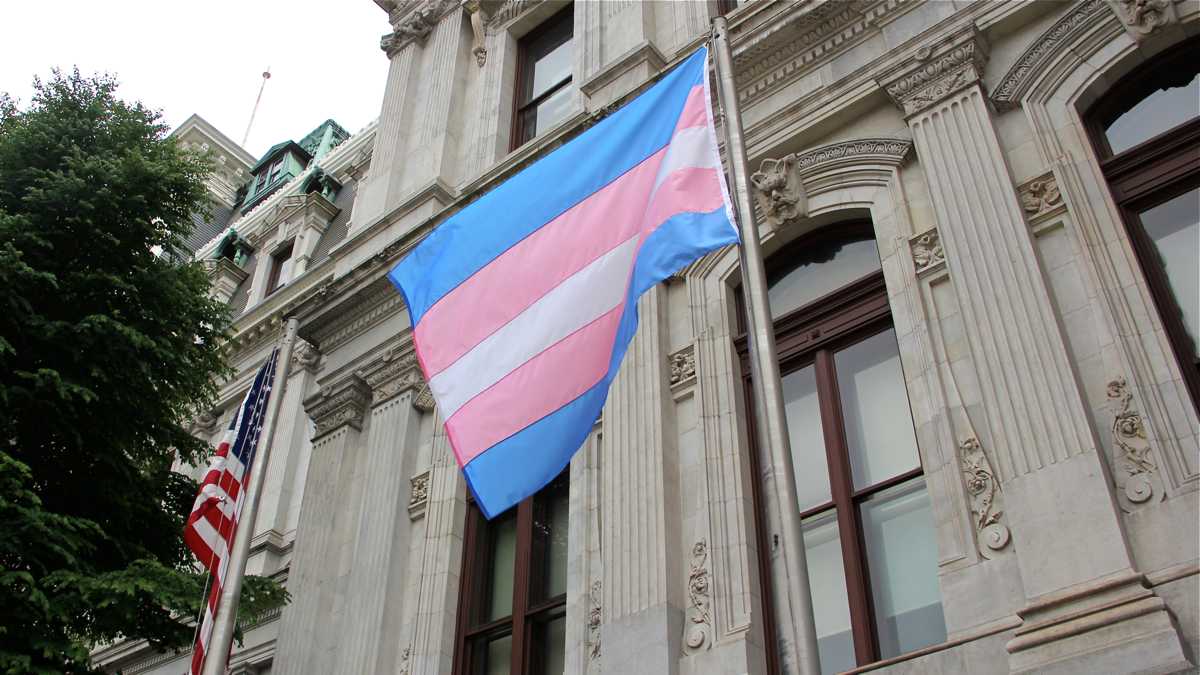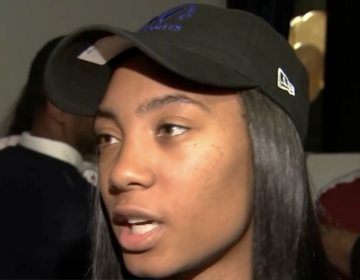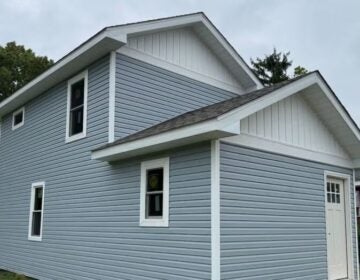Despite 50 years of LGB progress, aging transgender people face barriers to equality
It is still legal to discriminate in most states based on sexual orientation and gender identity. For aging transgender people, even more obstacles exist.

A flag representing transgender pride is shown flying at Philadelphia City Hall during the Trans Health Conference in June 2017. (Emma Lee/WHYY, file)
Speak Easy is examining priorities among LGBT communities in the Philadelphia region that persist beyond the issue of same-sex marriage. Seeking diverse perspectives on these issues, NewsWorks is hosting a public forum, “LGBT Priorities Beyond Marriage,” on Sept. 15 at WHYY studios. Registration is free at whyy.org/speakeasy.
—
Fifty-three years ago, I was headed to a bar for a regular Saturday night out. I was stopped by two cops and, half-an-hour later, found myself sitting in a police station interview room. I was grilled about where I was going and why I was going there. I had committed no crime, had done nothing illegal, nor had I been behaving suspiciously: My only offense was to be “walking while trans.”
The experience was devastating to me. Little did I know that this was destined to become a regular occurrence in my life. Eventually I grew blasé about this type of harassment, though less so about some of the comments I got from the public. If nothing else, I developed a thick skin, learned to be street smart and became involved in social justice activism. I joined the Gay Liberation Front, the Anti-Apartheid Movement and other organizations.
Fast forward to 2015. I now live in a country where the constitutional right to marriage equality has been confirmed at the highest level. I live in a city where the Philadelphia Fair Practices Ordinance protects me from unlawful discrimination in almost all situations. I even serve on the Police LGBT Liaison Committee. Five really good friends have recently tied the knot with their partners, and my own nephew has finally married his sweetheart of nine years. There has been enormous progress in LGBT rights over the last 50 years, so life is all good, isn’t it?
Well, as they say, not so much. Before we get totally swept away in the tidal wave of marriage equality euphoria, consider this: It is still legal to discriminate in most states based on sexual orientation and gender identity. For aging transgender people, even more obstacles exist. Although many states and big cities have a structure for services for older adults, very few of these service providers are equipped to deal with the challenges inherent in providing services to an aging transgender population. Few medical providers or social service agencies have undergone any cultural competence training to understand the needs of this population.
Many trans people have had such bruising encounters with the health care system through misgendering (sometimes intentional) and other forms of discrimination and disrespect that they have no primary care physician. As a result, they miss out on the basic preventive screenings and wellness care. Interaction with health providers only occurs in the context of an emergency room visit. By that time, what may have been a treatable issue has most likely escalated into a full-blown medical crisis. This is neither good medicine nor good economics.
Here’s another reality check: Trans people age faster than their non-trans counterparts. Studies also show that many trans older adults have experienced rejection by their families, and trans people have higher rates of unemployment and homelessness, which leads to the gender-segregated shelter system. Entry into that system can lead to assault and sexual violence. Some trans people have been so scarred by that experience that they prefer to live on the streets.
Safe and affordable housing for trans people is scarce and is a major problem in Philadelphia. Unemployment exacerbates the lack of housing options, and the threat of anti-trans violence is ever present. In the 20-some years that I’ve lived in Philadelphia, 19 transwomen, mostly transwomen of color, have been murdered in the city.
The almost inevitable outcome of the combination of all of these barriers faced by trans individuals is poverty. Poverty leads to poor nutrition and chronic illnesses. This toxic social environment can then lead to survival sex (trading sex for cash or shelter), substance abuse and HIV infection. It should come as no surprise that mental health issues are common and that suicide rates are well above the national average.
Later in life, many find themselves isolated in neighborhoods where they are at risk for harassment. Leaving this home means that they have to go into institutional care where they can be coerced into “de-transitioning” in order to comply with the institution’s policies.
Despite marriage equality and progress in LGBT rights over the past 50 years, many barriers to full equality and inclusion of trans people still exist. It is of critical importance that, at a bare minimum, Pennsylvania’s General Assembly pass legislation outlawing discrimination based on sexual orientation and gender identity. Similar legislation at the federal level would be ideal.
Trans people, especially older adults, are among the most invisible, marginalized and vulnerable members of society. They deserve so much more care and respect from the LGB community and society as a whole. Trans people, like all people, deserve equal rights and equal respect and equal care.
—
Dawn Munro is a biologist who was born in the UK and has worked in Europe and the United States. She has a long history of social activism dating back to the civil rights era of the 1960s and was active in the Gay Liberation Front. A resident of the John C Anderson LGBT Senior-friendly Apartments, she serves on the boards of the LGBT Elder Initiative and PFLAG. Dawn is grateful to the Big Bang for giving us Planet Earth and to Italy for giving us gelato.
WHYY is your source for fact-based, in-depth journalism and information. As a nonprofit organization, we rely on financial support from readers like you. Please give today.





